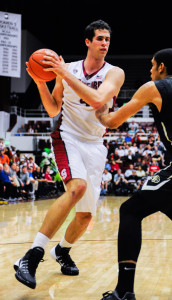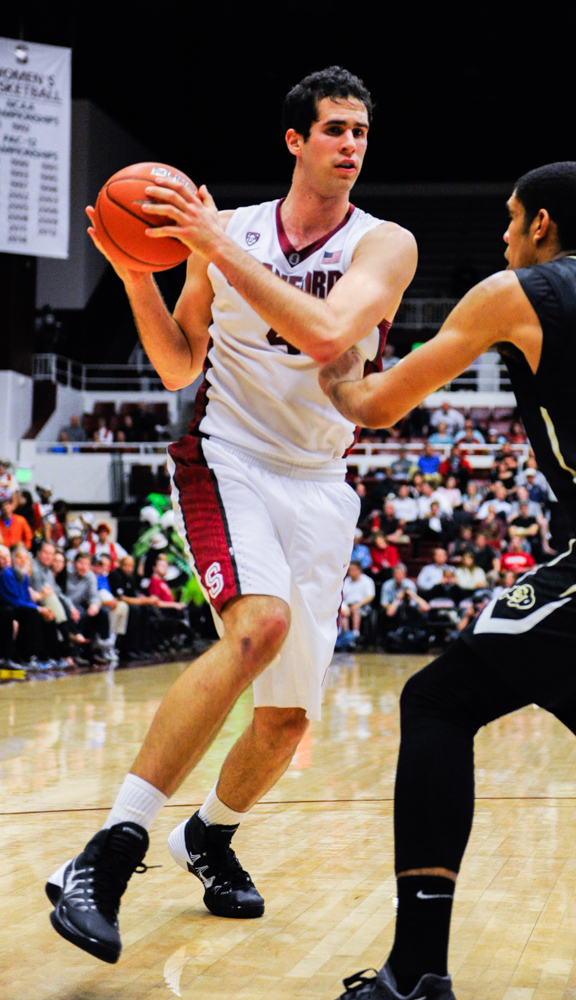With the win on Saturday against Utah, the Stanford men’s basketball team avoided ending the regular season on a sour note and, in the process, prevented further doubt from creeping into its NCAA tournament profile. The Cardinal (19-11, 10-8 Pac-12) escaped the Utes (20-10, 9-9) with a 61-60 victory on a late free throw by senior Dwight Powell, thus ensuring that the Cardinal would register their second winning conference season of the Johnny Dawkins era, and as a result, finish in a five-way tie for third place in the Pac-12.

The Cardinal enter the Pac-12 tournament this week in Las Vegas as the sixth seed due to the Pac-12’s multi-team tiebreak rules. Tied with Arizona State, Cal, Colorado and Oregon at 10-8, the Cardinal were placed sixth thanks to their performances against the other four teams.
ASU’s 5-3 record against the cluster of 10-8 schools meant that it would grab the third seed in the conference behind first-place Arizona and second-place UCLA. Cal was next, sporting a 3-1 record against the likes of Colorado, Oregon and Stanford. Colorado was seeded fifth due to its season sweep of the Ducks and the Cardinal, while Stanford was placed sixth and Oregon seventh because of Stanford’s 82-80 win over the Ducks on Jan. 12.
The rest of the seeds for the conference tournament include Utah being seeded eighth, Washington ninth, Oregon State 10th, Washington State 11th and USC 12th.
The tournament will commence on Wednesday, when the bottom eight teams open tournament play. As the top four seeds, Arizona, UCLA, ASU and Cal were given byes into the quarterfinals of the tournament.
As the sixth seed, Stanford will begin its quest for the Pac-12 tournament title during the final game scheduled on Wednesday, an 8:30 p.m. tipoff against 11th seed Washington State (10-20, 3-15).
Given that it received the sixth seed in the tournament, Coach Dawkins’ team probably could not have been more pleased with the draw.
The Cardinal will open up play against a WSU team that they have already defeated twice this season by an average of 22.5 points per game. Although the Cougars proved they are not to be taken lightly with an emphatic 73-55 rout of UCLA on Saturday, they have struggled for the majority of the conference season, and do not seem to match up well with Stanford. The Cardinal defeated WSU 80-48 at Maples Pavilion on Jan. 15 before taking care of business once more a month later during a 69-56 triumph in Pullman, Wash.
The Cougars failed to score consistently in both games against Stanford this season, a strong reflection of the struggling offense the team has put on the floor all season long. WSU averages just 62.4 points per game, a number that has dropped to 56.8 points per game during its conference slate. Even if the Cardinal fail to defend particularly well against Washington State, it seems unlikely that the Cougars have the offensive weapons to compete with Stanford’s potent starting lineup.
That’s not to say that WSU is devoid of any scoring threats on its roster. To the contrary, head coach Ken Bone and company are led by one of the best in the conference in junior guard DaVonte Lacy. Lacy’s 19.1 points-per-game scoring average is the second-best in the conference, and he has a propensity for scoring outbursts that have at times given superior teams plenty to be nervous about. His 39-point effort against Cal on Feb. 12 helped the Cougars push the Bears to overtime, while a 34-point performance against Colorado on Feb. 5 had the Cougars within three points of the Buffaloes with fewer than 10 seconds to play.
Washington State’s problem is that none of its next five leading scorers average double figures or shoot greater than 40 percent from the field. The Cougars have been simply unable to find secondary scorers during the course of the season. Expect that trend to continue on Wednesday, when the Cougars are confronted by a pair of the best individual defenders in the conference in Stanford’s Josh Huestis and Anthony Brown.
Assuming the Cardinal can get past the Cougars, they would match up with Arizona State in the quarterfinals of the Pac-12 tournament during the 8:30 p.m. time slot on Thursday. Stanford prevailed against ASU 76-70 at Maples on Feb. 1 before dooming itself with a poor start in a 76-64 defeat in Tempe, Ariz., on Feb. 26.
The single largest difference between Stanford’s performances against Arizona State on Feb. 1 and Feb. 26 was Stanford’s offensive execution, particularly in the turnover department. The Cardinal turned the ball over six more times in the loss to ASU than they did in the win, and the difference of effectiveness between the two games can easily be seen in the varied success of Powell, a player who relies on others to get him the ball during the flow of the offense.
In Stanford’s win, Powell was the most dominant player on the court, scoring 28 points and handing out five assists while leading a second-half charge that extended the Cardinal’s lead far enough to help stave off the Sun Devils in the end. In the loss, Powell looked out of sorts, scoring just 11 points on 2-of-9 shooting. If Stanford is going to make a run during the postseason, it is imperative that it gets its primary low post scoring threat involved, and that it does not waste possessions like it did during a 10-turnover performance during the first half at Arizona State.
Aside from taking care of the ball, Stanford can make its life easier by crashing the boards. Arizona State is the worst rebounding team in the conference, yet it handily outrebounded the Cardinal in Tempe. Dawkins’ crew would be wise not only to prevent that from happening again, but to take advantage of the Sun Devils’ greatest weakness.
Lastly, if the Cardinal didn’t know it by now, they should keep in mind that Tree-killing lumberjack Jahii Carson must be stopped. ASU’s sophomore guard is averaging 24.8 points per game in four career contests against the Cardinal, and was personally responsible for ousting Stanford from last year’s Pac-12 tournament. Just slowing him down might be enough to help Stanford reach the semifinals.
Should Stanford get that far, a relatively favorable matchup would probably await in the form of second-seed UCLA or seventh-seeded Oregon. The Cardinal has a combined 2-1 record against those two schools this season.
Pac-12 Tournament play for the Cardinal begins Wednesday in Las Vegas at noon.
Contact Daniel E. Lupin at [email protected].
